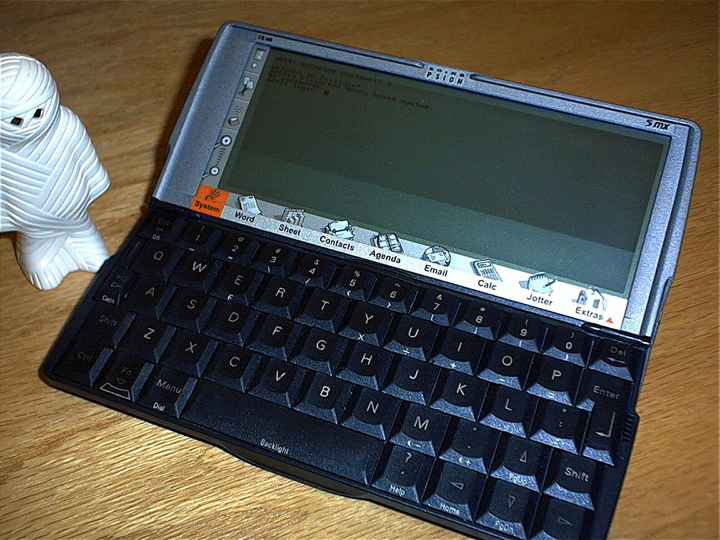The PsiLinux project is an effort to port the widely used Linux operating system to the various Psion hand held computers, and the Series 5MX/5MXPRO pocket computers, in particular. Some familiarity with linux in general is probably essential for getting PsiLinux going, although at least one of the prepackaged distributions (e.g., "Distorted Woody") are fairly complete and ready to go.
The team has ported the Linux 2.4.18 kernel to the Series 5MX/5MXPRO, created ARLO (the boot loader), and created several initial ramdisks (initrd) for the project. In addition, a number of larger prepackaged distributions based on Debian Woody have been made available for installation on compactflash disks.
At the moment, these distributions contain all the basic elements of any linux system: bash, vi (vim), groff, less, man, perl, nawk, bc, dc, lynx (a web browser), ppp, telnet, ftp (ncftp), rsh, ssh, minicom, emacs ("zile", a smaller emacs-type editor is probably preferred), etc. Starting with a basic system, it would be easy, though it would take a little time, to assemble your own custom system. All known systems are based on Debian Linux since this system has the best support for the ARM cpus. New debian arm packages (*_arm.deb, or a slimmer set of packages, *_arm.ipkg) can be downloaded and installed directly using "dpkg -i *_arm.deb", similarly for ipkg. Most people have been pleasantly surprised at how far along the whole PsiLinux project has come. PsiLinux is a fully functional, basic linux system. Slim windowing systems such as PicoGUI are being developed, and X11 now works "out of the box." Most of the larger distributions, or most useful systems, are fairly sizeable and so require a compactflash card of 64MB or greater in size (compactflash cards of up to 1GB are now available, but only those less than 512MB have been tested). Smaller systems based on initrd's can also be found, and they can be quite functional. The system seems to be quite stable - crashes or siezures, etc. are not reported very often any more.
Larger packages such as yorick - a numerical computation package vaguely like matlab - can also probably be installed except that this package required the X libraries, and so it would take up a great deal of space (I think yorick would work in console mode, if one had the space for it.) The gnu compilers could also be installed, and although they have been shown to work fine, they work rather slowly.
Processor - 32-bit ARM 710T CPU (RISC based), running at 36.864 MHz Internal Memory - 16, 24, or 32MB RAM Internal Memory - 10 MB ROM Removable Disk Type - Type I Compactflash (CF) Disks (disks of up to 512 MB have been tested; larger disks (to 1GB!) are untested) Display Resolution - 640x240 (Half-VGA) Display Type - Monochrome touch-screen (16 shades) Default OS - EPOC (32 bit, multitasking) Serial Ports - Standard RS232 and SIR Infrared; up to 115200 baud Power - 2 AA batteries, backed up by a CR2032 lithium battery. Approx. 30 hrs of operation. Optional 6V external power Screen Backlight Sound - 1/2 W, 8 ohm loudspeaker Microphone - electret with active gain control Keyboard - 53 key, QWERTY layout Size - 172X89X24 mm Weight - 350g (with batteries) Operating Temperature - 0 to 40 C
